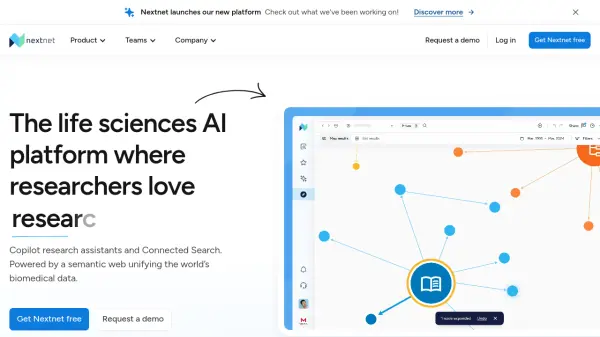What is Nextnet?
Nextnet provides a specialized AI knowledge platform designed specifically for the life sciences sector. It integrates an AI research assistant, known as Nextnet Copilot, with a powerful Connected Search Engine called Explorer. The platform's foundation is built upon what it describes as the world's largest semantic web of biomedical knowledge, unifying data from diverse sources including ChEMBL, Google Scholar, PubMed, and Ensembl. This unified structure aims to streamline the research process by helping scientists efficiently locate relevant information and uncover complex relationships within the data.
The platform focuses on delivering reliable, evidence-based insights. Nextnet Copilot generates answers grounded in verified scientific sources, mitigating the risk of hallucinations commonly associated with general AI models. Complementing this, Nextnet Explorer offers interactive visualization tools, allowing users to explore connections between literature, genes, drugs, targets, pathways, diseases, and more through dynamic maps or structured lists. This approach facilitates deeper analysis, brainstorming, and collaboration among research teams, ultimately saving valuable time typically spent on fragmented searches across multiple databases.
Features
- Nextnet Copilot: AI assistant delivering precise, evidence-backed answers sourced from Nextnet’s semantic web, free of hallucinations.
- Evidence-Backed Answers: Ensures research confidence with accurate responses grounded by verified scientific sources.
- Nextnet Explorer: Connected Search Engine visualizing data as interactive brainstorming maps or lists to reveal relationships.
- Visualize Connected Science: Discovers relationships across literature, genes, drugs, targets, pathways, diseases, institutions, and authors.
- One-Stop Research Hub: Unifies data from ChEMBL, Google Scholar, PubMed, Ensembl, and more, reducing search time.
- Nextnet Semantic Web: Transforms fragmented biomedical databases into a unified knowledge base using a vast semantic web of life sciences.
- Collaboration Features: Allows sharing, collaborating, and commenting on discoveries within teams.
Use Cases
- Accelerating life sciences research and development.
- Finding relevant scientific papers and data quickly.
- Discovering connections between genes, drugs, diseases, and pathways.
- Brainstorming research ideas using visual maps.
- Collaborating on research projects within teams or institutions.
- Supporting research in biotech startups, academia, and pharma.
- Providing evidence-based answers to complex research questions.
- Managing institutional knowledge in life sciences.
FAQs
-
Is it necessary to contact sales to try Nextnet?
No, Nextnet offers a free tier to start exploring its features without needing to contact the sales team. -
Does Nextnet's AI generate inaccurate or 'hallucinated' information?
Nextnet uses Generative AI with Retrieval-Augmented Generation (RAG) and specific guardrails, grounding its answers in verified scientific sources from its semantic web to avoid hallucinations. -
Can I use Nextnet for free?
Yes, Nextnet provides a free tier that includes core features and a sufficient usage allocation for initial exploration.
Related Queries
Helpful for people in the following professions
Nextnet Uptime Monitor
Average Uptime
99.86%
Average Response Time
97.2 ms
Featured Tools
Join Our Newsletter
Stay updated with the latest AI tools, news, and offers by subscribing to our weekly newsletter.











